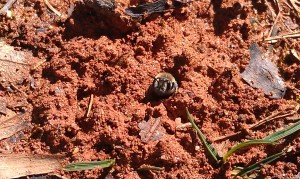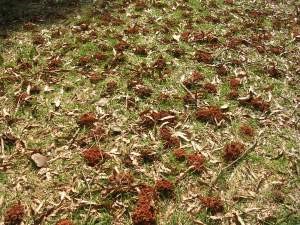In late March, as the soil warms up, it can be common to see small bees flying around just above the ground and small mounds of soil they have created in the lawn. These bees are called ground nesting bees.
Ground nesting bees are a type of bee that is different from other kinds of bees. These bees are solitary and nest unlike other species of bees that typically live together in a colony. A single female bee builds a nest by burrowing into the ground where she lays eggs and seals the entrance. After a few weeks of doing this, she will die leaving the next generation safe in the ground. In the spring, the bees complete their development and emerge as adults by digging their way out of the ground. Once emerged from the ground, these solitary bees begin to forage for nectar and pollen.
The site of many of these bees emerging and flying around the ground at the same time often triggers concern. Many people become concern that these small bees may sting. The good news is that the bees are completely harmless to humans and a lawn. The threat of being stung by ground nesting bees is very small. Majority of ground nesting bees seen flying around are males who do not have stingers and are simply looking for a female to mate with. The females, who are busy with nest construction in the ground, typically do not have well-developed stingers. Ground nesting bees can be handled with little to no risk of being stung. Ground nesting bees are not aggressive because they are solitary bees who work and fly alone instead of together in a colony.
Some people become concerned that the bees will damage their lawn when they see the many small mounds of soil. The bees do not damage the lawn in anyway and actually help aerate a lawn. These bees prefer to nest in dry soils where the grass is thin. The bees don’t make the lawn this way but just take advantage of the conditions. If you are bothered by soil mounds they create in a lawn, you can create a less favorable environment for them. Since they like dry soils, irrigation over the 3 to 4 weeks they are active can encourage them to find other nest sites. In addition, they like thin lawns with plenty of bare spots. Thus, you can take measures to improve the density of your grass to make it less appealing to bees.
The recommendation when you see ground nesting bees in the spring is to simply ignore them and they will soon be gone. Ground nesting bees are native bees. They are beneficial insects that are important for pollination of many plants. Since they are beneficial and harmless it is not recommended to control them with an insecticide but to instead protect them.
Jessica Strickland is an Agriculture Extension Agent, specializing in horticulture for North Carolina Cooperative Extension in Wayne County.

(Photo Credit: S.D. Frank, NC State University)

(Photo Credit: S.D. Frank, NC State University)

